Items
Tag is exactly
Afghanistan
-
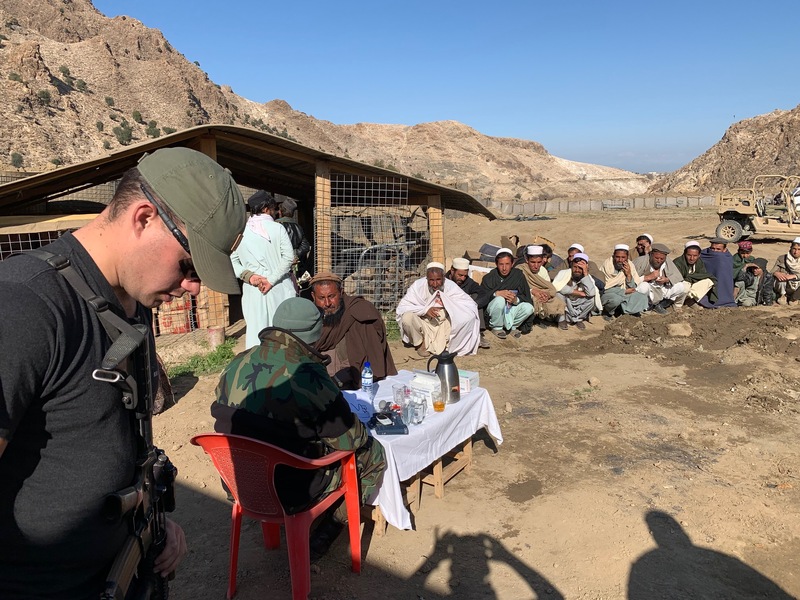 2020-02-18
2020-02-18Patients and Patience
I spent the majority of 2019 in Afghanistan. As far as deployments go, it was as busy as it was rewarding. I spent my days providing medical care to the local Afghans which included the handling of war wounds, managing chronic diseases, or treating any number of the infectious diseases that are endemic to the Middle East. My day-to-day activities had me in regular contact with sick people, and it was my responsibility to help them. Later in the year, a sickness began to go around. Across the country service members and civilians alike were coming down with what was presumed to be the flu. With consistently negative tests, however, medical professionals began looking to other causes for the wide range of symptoms people were suffering from. When I got sick, I lost my voice for a month and could barely walk out of my room without losing my breath and so I resolved to spending my time lying in bed and watching movies. When I returned home from Afghanistan in early 2020, I still wasn’t quite recovered. Unfortunately, my homecoming was not an elaborate affair as my wife and children were waiting for me in Texas where they had spent my deployment near family. The plan was for me to visit until it was time for me to move down there as well. I still suffered from shortness of breath and one day, shortly after returning, I nearly passed out on a light jog, and I knew something was wrong. I was scheduled to visit my wife and kids in the coming weeks, excited to see them after my deployment, but my unknown sickness had other plans in mind. At this point in the year, COVID was in its infancy, there hadn’t been any lockdowns or travel restrictions, only the lingering concern that this new disease could become a problem. So, naturally, when I went in to see the doctors for my persistent symptoms, it was an easy assumption that I had caught COVID early while in Afghanistan in the months prior. While investigating the cause of my ongoing issues, they found a nodule in my lungs. Apparently, my weakened immune system and constant contact with severely sick patients had resulted in me contracting tuberculosis. I was now a high-risk patient. The ironic thing is that my newly diagnosed condition was contagious, and not being near my family prevented me from spreading it to my wife or kids. So much for visiting family after my deployment. Over the next few months, I was treated with heavy duty antibiotics that left me puking in the mornings and unable to leave my house, which became easier and easier as COVID gripped the world. Flights were canceled and lockdowns were enforced while I facetimed my family 1,500 miles away. After my treatment was complete, I eagerly drove home on empty roads to see my family for the first time since I had left the year prior. I would intermittently make the drive a few more times before I made the official move down later that year. Three years later, I still remember, as I’m sure we all do, the frustrations that were ever-present at the height of the pandemic. I remember my own frustrations at the difficulty of traveling down to see my kids, something that hadn’t been part of our well laid plans before my deployment. I remember having to explain to three young children why I couldn’t come home and helping my wife explain why they could no longer go to the park, to school, or hang out with their friends. In the end, however, I am grateful. I am grateful because I am able to teach them, through their own personal experiences, that we are all in this together. When they express annoyance at ongoing COVID policies, which cost them personal convenience, I can recount to them the sacrifices they made in order to keep us all safe from my sickness as well as COVID. They have learned that being patient and considerate is as much for everyone’s else’s sake as much as their own and it’s a lesson that has translated across their lives today. -
 2021-08-16
2021-08-16False Promises?
After 20 years of bloodshed, the Us military forces withdrew from Afghanistan, leaving it under Taliban rule. The departure was followed by a , two week process of which more than 120,000 people tried to evacuate (Council of Foreign Affairs, "The US War in Afghanistan" The tweet depict the heartbreaking images of crowds of people trying to cling to the sides of Us military planes at the Kabul airport and tweets from US civilians sympathizing with the troubles overseas. -
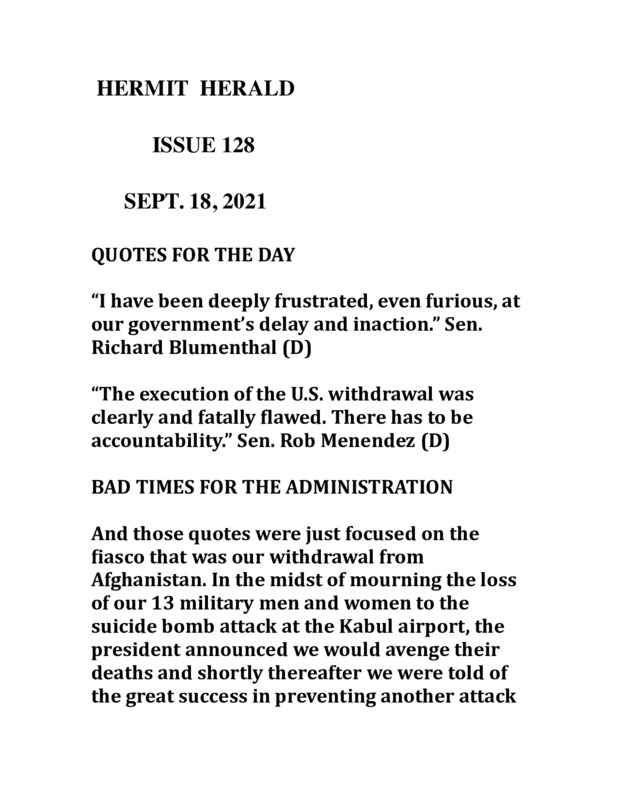 2021-09-18
2021-09-18HERMIT HERALD, ISSUE 128
Afghanistan exit and U.S. border- a Biden disaster -
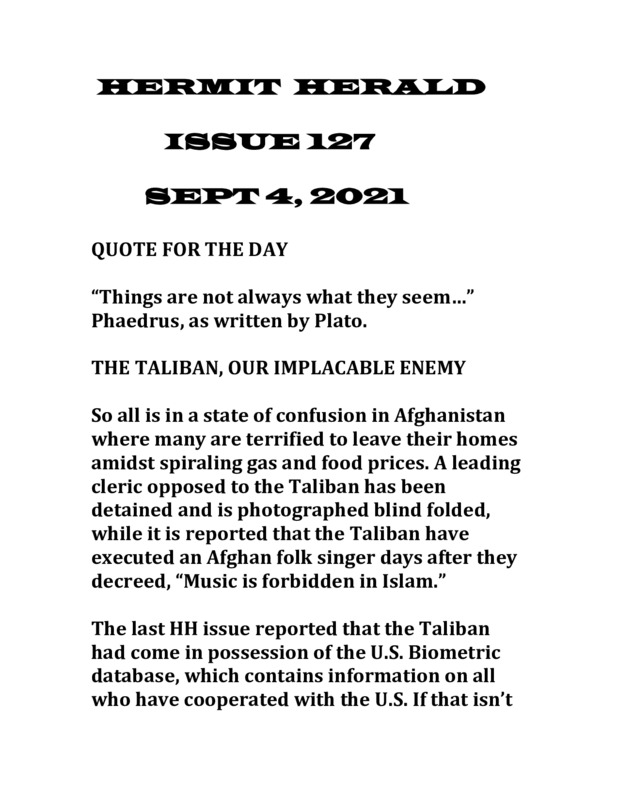 2021-09-04
2021-09-04hermit HERALD, ISSUE 127
Taliban need outside help -
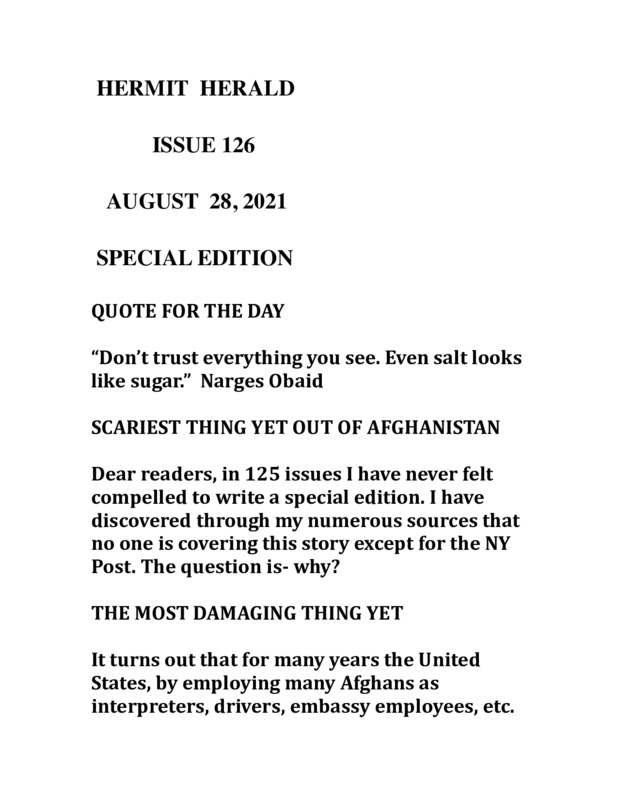 2021-08-28
2021-08-28hermit HERALD, ISSUE 126
U.S. biometric database in hands of Taliban -
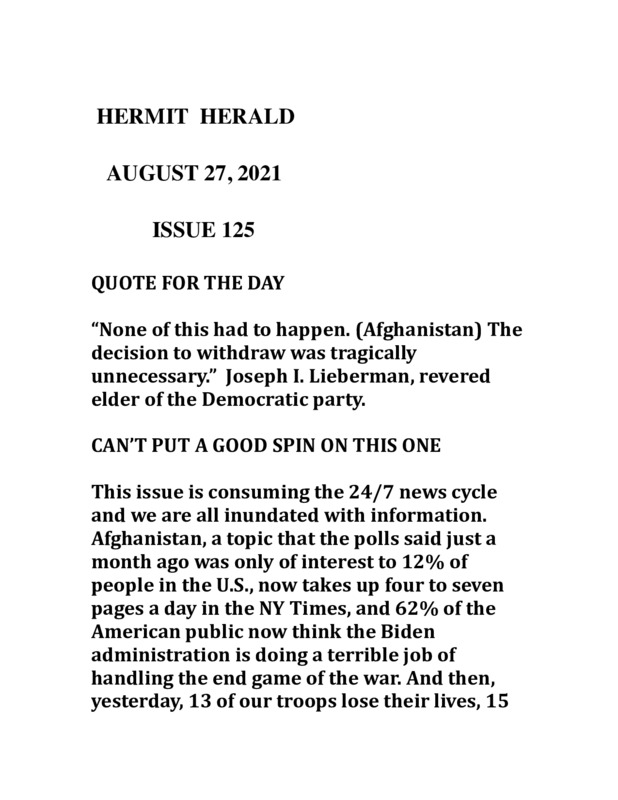 2021-08-27
2021-08-27hermit HERALD, ISSUE 125
Afghanistan, "None of this had to happen." -
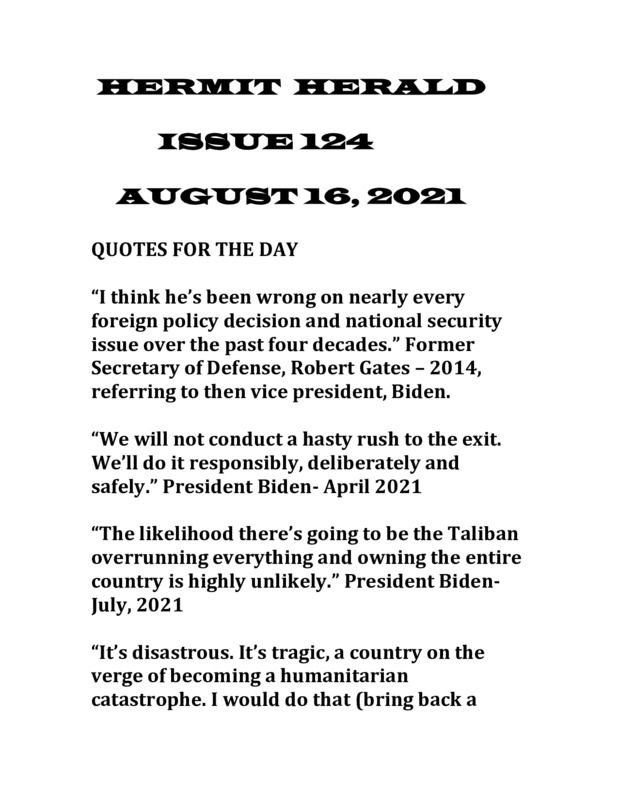 2021-08-16
2021-08-16hermit HERALD, ISSUE 124
Afghanistan government falls -
 2021-07-19
2021-07-19HERMIT HERALD, ISSUE 121
Afghanistan- not forgotten? -
 2021-07-11
2021-07-11hermit HERALD, ISSUE 120
Disagreement with Biden over Afghanistan -
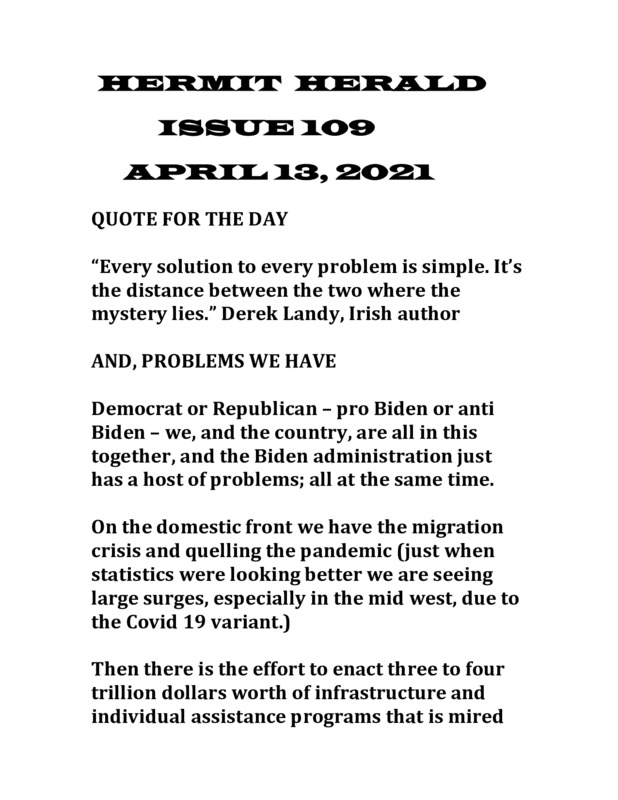 2021-04-13
2021-04-13hermit HERALD, ISSUE 109
Huge problems for Biden -
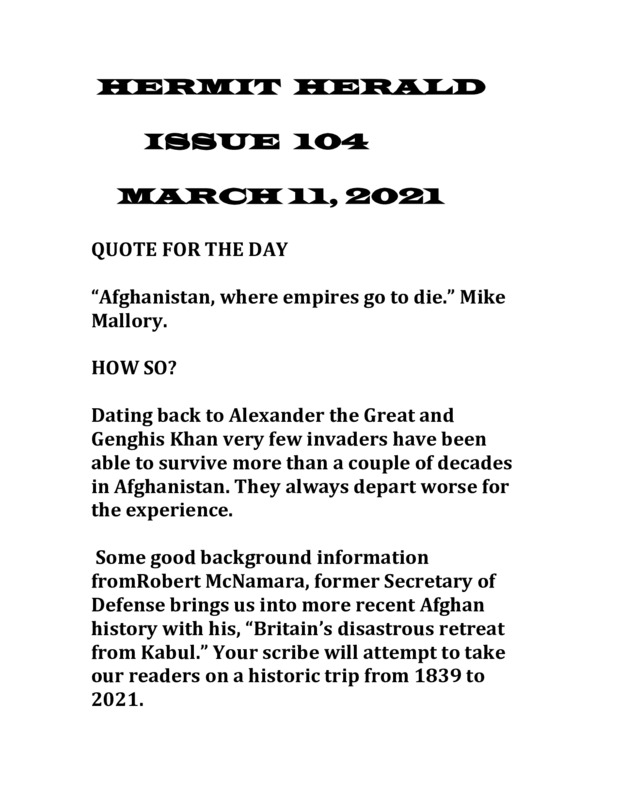 2021-03-11
2021-03-11hermit HERALD, ISSUE 104
"Afghanistan, where empires go to die" -
 2020-08-11
2020-08-11hermit HERALD VOL 1 ISSUE 55
CV and Sturgis, SD -
 2020-07-14
2020-07-14HerMIT HERALD VOL 1 ISSUE 49
WWIII on simmer -
 2020-07-01
2020-07-01hermit HERALD VOL 1 ISSUE 45
you can't have it both ways -
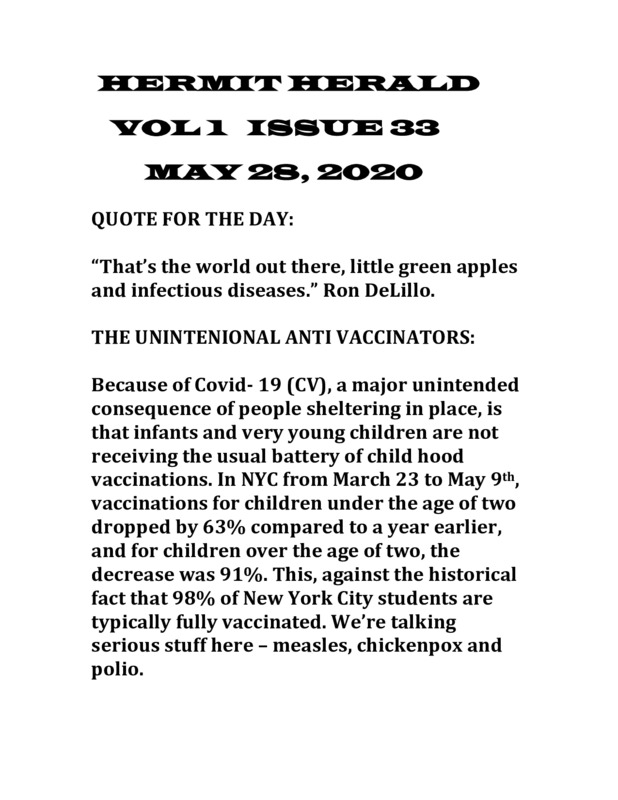 -2020-05-28
-2020-05-28HERMIT HERALD VOL 1 ISSUE 33
pandemic related world events -
 2020-04-30
2020-04-30Deployed in Afghanistan during COVID-19 #REL101
I am currently deployed in Afghanistan and have no idea when I will return home to the states due to COVID-19 travel bans. I have been here for about 7 months now and was supposed to leave soon but we have been informed it is a strong possibility we will be extended. Through these tough times it is even harder for troops that have been away from their families for so long only to be told they cuts wait longer. We have limited access to amenities such as gyms and MWR(game rooms) due to social distancing. I hope that resolutions for the virus will soon be found and we can return home safe and sound #REL101 -
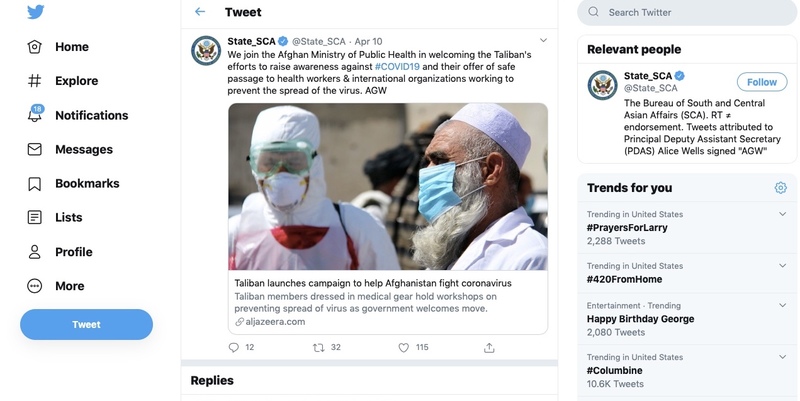 2020-04-10
2020-04-10Digital Diplomacy: State Department Praises Taliban
This is a tweet by the United States State Department Bureau of South and Central Asian Affairs, attributed to its Principal Deputy Assistant Secretary, Alice Wells. This tweet is an example of digital diplomacy and practical geopolitics. According to Jason Dittmer and Daniel Bos digital diplomacy refers to diplomatic outreach through social media by policy makers and government officials; practical geopolitics is the discourse associated with politicians and policy makers. The tweet also touches on how the international system is divided into nation-states, yet many fail to govern effectively and there are bad actors that take on responsibilities of the state. Furthermore, in a world of social distancing and limited human interaction digital diplomacy is sure to gain more prominence. During this pandemic, we should all be more acutely aware of how geopolitics is playing out through virtual mediums. There are few interesting elements to this tweet. First of all, the state department rarely ever praises the Taliban for anything. Important context for this praise is the recent peace initiative of the United States for the Taliban and the Afghan government. The recent peace deal brokered by the United States between the Taliban and Afghan Government is incredibly fragile. This context likely informed the State Department’s decision to praise the Taliban. However, the State Department should be prioritizing working with the Afghan government, not the Taliban. Second, this statement of praise for the Taliban acknowledges a great extent of agency and power by the Taliban and the limitations of the Afghan government. The Taliban is a bad non-state actor, but this tweet acknowledges their capacity to provide leadership and services of a state. COVID-19 has created another stage where the Taliban can compete against the Afghan government, and so far the Taliban has responded to this crisis more effectively. Finally, this tweet undermines the popular discourse of COVID-19 versus nation-states. For the most part, responses to COVID-19 are examined on a national level. The prevailing discourse on COVID-19 responses is about the effectiveness of a certain nation-state’s response to the virus. However, this tweet brings up the fact that many governments and nation-states around the world fail in effective governance and that this leaves openings for non-state actors to take on responsibilities of a state. COVID-19 is testing the limits of nation-states’ power and effectiveness and in many places any shortcomings may be corrected by non-state actors (even if they are bad actors). What remains to be seen is if increased constructive interaction between bad non-state actors and the citizens of nation-states leads to an increase in future positive interactions, or if this phenomenon is exclusive to the COVID-19 crisis.
